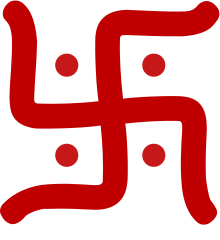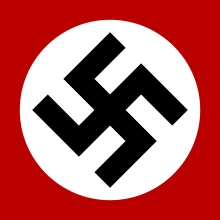swastika
English


Etymology
From Sanskrit स्वस्तिक (svastika), from सु (su, “good, well”) + अस्ति (asti), a verbal abstract of the root of the verb "to be", स्वस्ति (svasti) thus meaning "well-being" — and the diminutive suffix क (ka); hence "little thing associated with well-being", corresponding roughly to "lucky charm". First attestation in English in 1871, a Sanskritism that replaced the Grecian term gammadion. From 1932 onwards it often referred specifically to the visually similar hooked cross (German Hakenkreuz) emblem popularized by the National Socialist German Workers’ Party.
Pronunciation
- Lua error in Module:parameters at line 290: Parameter 1 should be a valid language or etymology language code; the value "RP" is not valid. See WT:LOL and WT:LOL/E. IPA(key): /ˈswɒstɪkə/, /ˈswɒstəkə/
- Lua error in Module:parameters at line 290: Parameter 1 should be a valid language or etymology language code; the value "GA" is not valid. See WT:LOL and WT:LOL/E. IPA(key): /ˈswɑstɪkə/, /ˈswɑstəkə/
- Lua error in Module:parameters at line 290: Parameter 1 should be a valid language or etymology language code; the value "NZ" is not valid. See WT:LOL and WT:LOL/E. IPA(key): /ˈswɔstɘkɘ/
Noun
swastika (plural swastikas)
- A cross with arms of equal length all bent halfway along at a 90° angle to the right or to the left, used as a religious symbol by various ancient and modern civilizations, and adopted more recently (with arms angled to the right) as a symbol of National Socialism and fascism.
- 1888, Rudyard Kipling, ‘The Sending of Dana Da’, In Black and White (Folio Society 2005), page 423-4:
- This was signed by Dana Da, who added pentacles and pentagrams, and a crux ansata, and half-a-dozen swastikas, and a Triple Tau to his name, just to show that he was all he laid claim to be.
- 2009, Diarmaid MacCulloch, A History of Christianity (Penguin 2010), page 270:
- It is clear from archaeological finds that they enjoyed wearing Christian crosses, though they might enliven these with such symbols as the Indian swastika which Buddhists had brought them.
- 1888, Rudyard Kipling, ‘The Sending of Dana Da’, In Black and White (Folio Society 2005), page 423-4:
Synonyms
- Black Spider
- (in heraldry): crooked cross, cross cramponned, cross cramponnée, cross cramponny
- cross gammadion, gammadion, gammation
- (chiefly in architecture and heraldry) fylfot
- hooked cross
- manji
- sauwastika, sauvastika
- sun wheel
- tetraskelion
- Thor's hammer (rare; more commonly refers to a T-shaped symbol)
- thunder cross
- twisted cross
Translations
a cross with arms of equal length all bent halfway along at a 90° angle
|
Dutch
Pronunciation
Audio: (file)
Noun
swastika f or m (plural swastika's)
Categories:
- English terms derived from Sanskrit
- English 3-syllable words
- English terms with IPA pronunciation
- English lemmas
- English nouns
- English countable nouns
- en:Crosses
- en:Nazism
- en:Religion
- Dutch terms with audio links
- Dutch lemmas
- Dutch nouns
- Dutch nouns with plural in -s
- Dutch feminine nouns
- Dutch masculine nouns
- Dutch nouns with multiple genders
